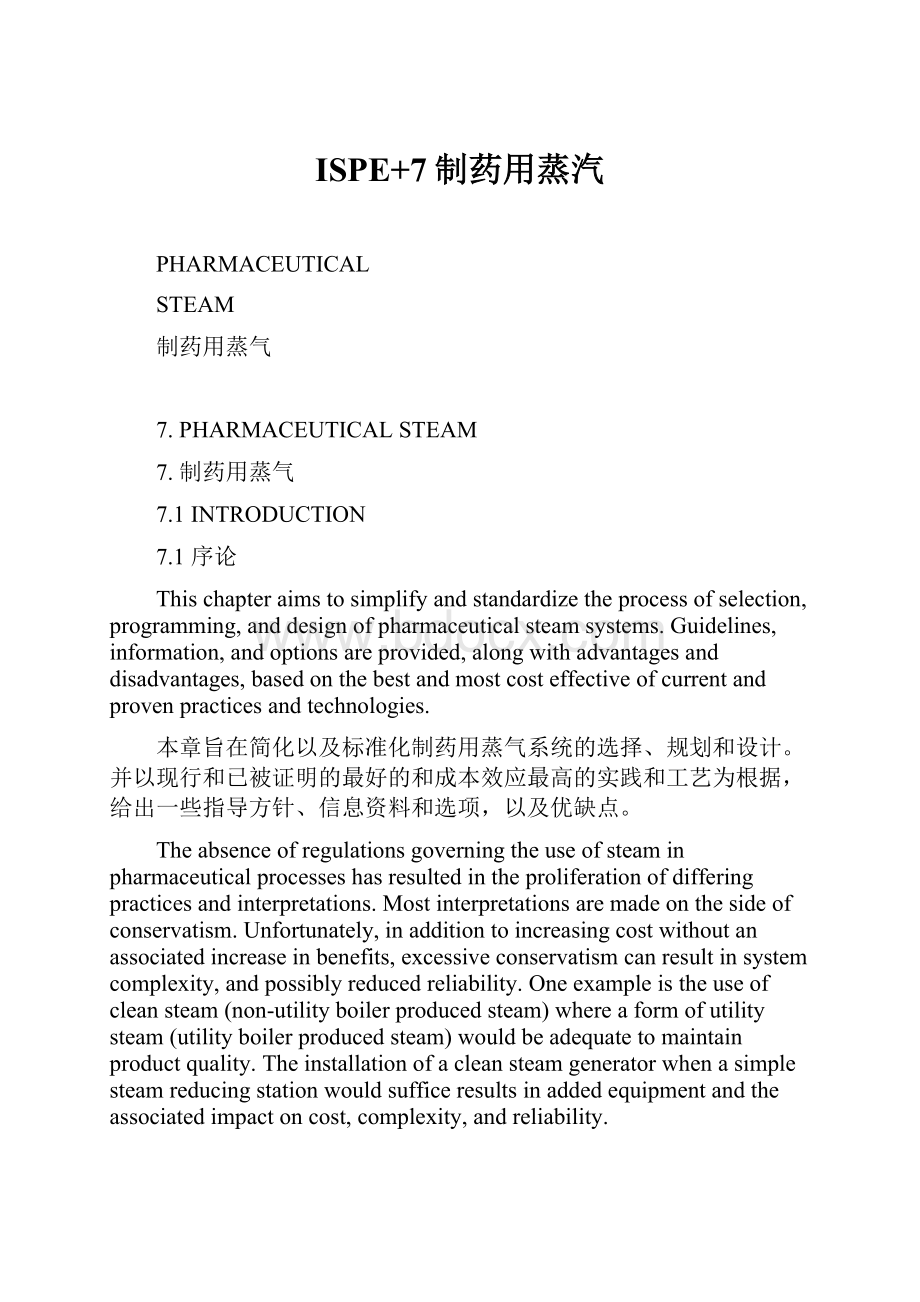ISPE+7制药用蒸汽.docx
《ISPE+7制药用蒸汽.docx》由会员分享,可在线阅读,更多相关《ISPE+7制药用蒸汽.docx(42页珍藏版)》请在冰豆网上搜索。

ISPE+7制药用蒸汽
PHARMACEUTICAL
STEAM
制药用蒸气
7.PHARMACEUTICALSTEAM
7.制药用蒸气
7.1INTRODUCTION
7.1序论
Thischapteraimstosimplifyandstandardizetheprocessofselection,programming,anddesignofpharmaceuticalsteamsystems.Guidelines,information,andoptionsareprovided,alongwithadvantagesanddisadvantages,basedonthebestandmostcosteffectiveofcurrentandprovenpracticesandtechnologies.
本章旨在简化以及标准化制药用蒸气系统的选择、规划和设计。
并以现行和已被证明的最好的和成本效应最高的实践和工艺为根据,给出一些指导方针、信息资料和选项,以及优缺点。
Theabsenceofregulationsgoverningtheuseofsteaminpharmaceuticalprocesseshasresultedintheproliferationofdifferingpracticesandinterpretations.Mostinterpretationsaremadeonthesideofconservatism.Unfortunately,inadditiontoincreasingcostwithoutanassociatedincreaseinbenefits,excessiveconservatismcanresultinsystemcomplexity,andpossiblyreducedreliability.Oneexampleistheuseofcleansteam(non-utilityboilerproducedsteam)whereaformofutilitysteam(utilityboilerproducedsteam)wouldbeadequatetomaintainproductquality.Theinstallationofacleansteamgeneratorwhenasimplesteamreducingstationwouldsufficeresultsinaddedequipmentandtheassociatedimpactoncost,complexity,andreliability.
在制药工艺中指导蒸气使用的法规缺乏导致衍生出不同实践和理解。
大多数理解是保守的。
不幸的是,这除了增加成本外没有相应的增加利益,过度的保守能够导致系统复杂并且可能减少其可靠性。
举个例子,在一种公用蒸气(公用锅炉产生的蒸气)就足以维持产品质量的地方使用清洁蒸气(非公用锅炉产生的蒸气),在一个普通蒸气简化装置就能满足需要时安装一个清洁蒸气发生器,这导致设备增加并在成本,复杂性以及可靠性方面造成相关影响。
Insomeinstances,interpretationsarebasedoninaccurateassumptionsofwhatisimportantorcritical.AnexampleistheoverspecifyingofpretreatmentorusingWFIasfeedtosolvetheperceivedproblem.
在某些情况中,理解是建立在不准确假设“什么是重要或关键的”基础上的。
举个例子,比如过度规定预处理或使用注射用水作为给水来解决那些已察觉的问题。
Thechapterestablishesstandarddefinitionsfortermscommonlyassociatedwithpharmaceuticalsteamandprovidesinformationthatfacilitatesmakingcorrectandcosteffectivedecisions.
本章为制药用蒸气相关的术语制定了标准定义,并为促使作出正确和成本有效的决定提供了信息。
7.2cGMPISSUES
7.2cGMP出版物
Theuserhastheultimateresponsibilityforsystemdesignandperformance,andforensuringthatthepropertypeofsteamisusedforagivenprocess.
用户对系统的设计和性能拥有最终职责并要确保适当类型的蒸气用于给定的工艺。
ThereisnoFDAorUSPminimumstandardforcleansteam.However,cGMPsforlargevolumeparenterals(LVPs)issuedin1976indicatedthatfeedwaterforboilerssupplyingsteamthatcontactcomponents,drugproducts,anddrugproductcontactsurfacesshallnotcontainvolatileadditivessuchasaminesorhydrazines.
对于清洁蒸气,FDA或USP没有最低标准。
然而,1976年发行的cGMP关于大容量注射液部分表明供应蒸气的锅炉的给水、接触组件、药品和药品接触面不能包含挥发性添加剂比如胺或联胺。
Fewregulationsgovernthedesignandconstructionofcleansteamgenerators.Therearealsonoregulationsgoverningmaterialsofconstruction,typeorlevelofinstrumentation,surfacefinishes,oroperatingtemperatures.
很少法规管理清洁蒸气发生器的设计和构造,也没有法规管理构造材料、使用仪器的类型和等级、表面抛光或操作温度。
AmongUSGovernmentpublications,theFDA'sCodeofFederalRegulations(CFR)providesculinarysteamrecommendationsandstipulationsrelatedtoheatexchangerandtankairventsdesignandconstruction.TheCulinarysteamrecommendationsapplytofoodapplicationsonly.
在美国政府出版物中,FDA的联邦管理法规(CFR)提供厨房用蒸气的优点和关于热交换器及水罐排气口设计、构造的规定。
建议厨房用蒸气只用于食品应用。
USPublicHealthService/DairyIndustryCommittee,3ASanitaryStandards,Number609-02,addsadditionallimitationstoCulinarysteamfeedwateradditivesforfoodapplications.Itshouldbenotedthatboilerfeedwateradditivespermittedinfoodforhumanconsumptionmaynotbeacceptableindrinkingwaterororallyingesteddrugproducts.
美国公共卫生部门/乳制品工业委员会,3A卫生标准,编号609-02,为食品应用而对厨房用蒸气给水添加剂增加附加限制。
应该注意人用食品中的锅炉给水添加剂不能用于饮用水或口服药品。
7.2.1SteamAttributes
7.2.1蒸气特质
7.2.1.1Quality
7.2.1.1质量
Theterm"Quality"whenreferringtosteamindicatesthelevelofsteamsaturation.TherearenoFDAorUSPregulationsrelatingtominimum"steamquality"orthelevelofnon-condensablegassespresentinpharmaceuticalsteam.(SeeSection7.4.)
当涉及蒸气时,“质量”术语表示蒸气饱和标准。
没有关于最低“蒸气质量”或在制药用蒸气中不可压缩气体标准的FDA或USP法规。
(参看7.4部分)
Europeanregulatorshavedefinedspecificcriteriaforpharmaceuticalsteamusedforequipmentsterilization.(EuropeanStandardEN285-SteamSterilizers-referencesection13.3)Thesecoveracceptablelevelsofsaturationordryness,thelevelofsuperheat,andthevolumeofnon-condensablegasespresent.
欧洲法规对用于设备灭菌的制药用蒸气规定了具体标准。
(欧洲标准EN285-蒸气灭菌器-参考13.3部分)。
这些包含饱和或干燥标准、过热标准和不可压缩气体体积。
7.2.7.2Purity
7.2.7.2纯度
Purityrequirementsforsteamusedinpharmaceuticalmanufacturingandproductdevelopmentaredrivenbytheproductcharacteristics,manufacturingprocess,andtheintendeduseoftheproduct.Theproductmanufacturerisresponsibleforensuringthatsteamusedtoprocesstheproductisappropriate.
用于制药生产和产品研制的蒸气纯度要求由产品特性、生产工艺和产品预期用途决定。
药品生产商有责任确保将合适的蒸气用于药品生产。
Thoughsteampurityrequirementsareproductspecific,itmaybeimpracticaltoreliablyproducespecialsteamforeachsituation.Manufacturingoperationstypicallygenerateanddistributeonlyoneortwosteampuritygrades,commonlygrouped.
虽然蒸气纯度要求是因产品特性而不同,但为每个情况可靠地生产特殊蒸气是不实用的。
生产操作典型地产生和分配一般分组为一种或两种的蒸气纯度等级。
7.3TYPESOFSTEAM
7.3蒸气类型
Pharmaceuticalsteamisclassifiedintotwo
(2)typesbasedontheirrespectivesources.Theseare:
1)Utility-Boilerproducedsteam,hereaftercalledUtilitySteam.
2)Non-UtilityBoilerproducedsteam,hereaftercalledCleanSteam.
根据它们各自的来源,制药用蒸气分为两种类型。
它们是:
1)公用锅炉产生的蒸气,此后叫做公用蒸气。
2)非公用锅炉产生的蒸气,此后叫做清洁蒸气。
7.3.1UtilitySteam
7.3.1公用蒸气
Utilitysteamischaracterizedwithusuallyhaving:
•Chemicaladditivestocontrolscaleandcorrosion
•Relativelyhighpressurewiththepotentialofgeneratingsuperheatduringexpansion
•RelativelyhighpH
公用蒸气通常具有以下特征:
•用于控制水垢和腐蚀产物的化学添加剂
•伴随在膨胀时产生过热潜在性的相对高压
•相对的高pH值
Chemicaladditives:
Utilitysteamisproduced,inmostcases,usingconventionalfire-tubesteamboilers,normallyofsteelconstruction.Suchboilersarealmostalwaysprovidedwithsystemsthatinjectadditivesinthefeedwatertoprotecttheboilerandsteamdistributionpipingfromscaleandcorrosion.Someofthesescaleandcorrosioninhibitorsmay,andoftendo,includeaminesandothersubstancesthatmaynotbeacceptableinsteambeingusedinpharmaceuticalprocesses.Theusermustdeterminewhatadditivesareused,andverifyiftheyareacceptableintheparticularapplication,i.e.,donotaddanyimpuritiesorcreateareactioninthedrugproduct.
化学添加剂:
在多数实例中,使用常规钢结构火管蒸气锅炉产生公用蒸气。
这种锅炉几乎总是规定在给水中注入添加剂来保护锅炉和蒸气分配管道以免产生水垢和腐蚀。
一部分这些水垢和腐蚀抑制剂可能并且经常使用,包括胺和不适用于制药工艺所用蒸气的其他物质。
用户必须决定使用哪种添加剂并且验证它们是否可适用于特定应用,比如,不能在药品中添加任何杂质或产生反应。
Utilitysteamcanbefilteredtoremoveparticulatematter,butfiltrationdoesnotremovedissolvedsubstancesandvolatilessuchasamines.
可以过滤公用蒸气除去颗粒物,但是滤器无法去除已溶解物质和挥发物比如胺。
Superheat:
Superheatedsteamisproducedinwatertubeboilersbyreheatingthesteamorbygeneratingthesteamatahigherpressureinafiretubeboilerandthenreducingthepressurethrougharegulatingvalve.Whenthepressureisreduced,theenergyinthehighertemperaturesteamisdissipatedtogeneratesteamatthelowerpressureandproducesuperheatedsteamabovethecorrespondingsaturationtemperature.Superheatisdissipateddownstreamoftheregulatingvalveduetoheatlossintheline.
过热:
在水管锅炉中通过再加热蒸气产生过热蒸气或者在火管锅炉中通过在更高的压力下产生蒸气然后使用调节阀减低压力来产生过热蒸气。
当压力减低时,较高温度蒸气中的能量消散会产生较低压力下的蒸气并同时产生超过相应饱和温度的过热蒸气。
由于管线的热损失,过热在调节阀的下游消散。
pHcontrol:
Inordertoprotectcarbonsteelfromcorrosionbythesteam,itisnecessarytouseadditivestoraisethepHtobetween9.5-10.5.
pH控制:
为保护碳钢制品不被蒸气腐蚀,有必要使用添加剂将pH值升高到9.5-10.5之间。
7.3.2CleanSteam(CS)
7.3.2清洁蒸气(CS)
Pharmaceuticalcleansteamisgeneratedfromtreatedwaterfreeofvolatileadditives,suchasaminesorhydrazines,andisusedforthermaldisinfectionorsterilizationprocesses.Itisconsideredespeciallyimportanttoprecludesuchcontaminationfrominjectabledrugproducts:
制药用清洁蒸气是从不含有挥发性添加剂(例如胺或联胺)的净水中产生,并用于热灭菌或灭菌过程。
从注射用药品中清除这类污染是尤其重要的:
Cleansteamischaracterizedashaving:
•Noadditives
•Nogeneratedsuperheatexceptwhenthegeneratedpressureissignificantlyhigherthantheusepressureofthesteam.(SeeSection7.3.1-Superheat.)
•RelativelylowpH
清洁蒸气具有下列特征:
•没有添加剂
•不产生过热,除非产生的压力显著高于蒸气使用压力(参看7.3.1部分-过热)
•相对低pH值
TherearemanytermsusedinthepharmaceuticalindustrytodescribeCleanSteam.TheseincludeCleanSteam,PureSteam,PyrogenFreeSteam,WFISteam,andUSPPurifiedWatersteam.Thereisnostandardoraccepteddefinitionforanyoftheseterms.However,themostcommonlyusedtermsare"PureSteam"and"CleanSteam".InthisGuide,theterm"CleanSteam"isusedinlieuofallothers.
ThecondensateofCleanSteamhasnobuffer,andmayhavearelativelylowpHcomparedtothatofutilitysteam.
在制药工业中有很多术语用于描述清洁蒸气。
这些包括清洁蒸气、纯蒸气、无热原蒸气、注射用水蒸气和USP纯化水蒸气。
对任何这些蒸气都没有标准或公认定义。
然而,大多数通常使用的术语是“纯蒸气”和“清洁蒸气”。
在本指南中,使用“清洁蒸气”术语替代其他所有术语。
清洁蒸气的冷凝液没有缓冲系统,并且与公用蒸气相比它具有相对低pH值。
7.4BACKGROUNDANDINDUSTRYPRACTICES
7.4背景和工业实践
7.4.1Purityofsterilizingsteam
7.4.1灭菌蒸气纯度
Whensteamortheresultingcondensedwatercomesindirectorindirectcontactwiththedrugproduct,thepurityshouldbeequivalenttothewaterpurityacceptableforfinalrinsingofthedrugcontactsurfaces.
当蒸气或其产生的冷凝水与药品有直接或间接接触时,其纯度应该与最终冲洗药品接触面合格的水纯度相同。
Note:
AcontinuoussupplyofDrySaturatedSteamatthepointofuseisconsiderednecessaryforefficientsteamsterilization.Watercarriedbythesteaminsuspensionmaycausedamploadsandsuperheatedsteamisconsiderablylesseffectivethansaturatedsteamwhenusedforsterilization.Non-condensablegasesifcontainedinthesteammaypreventtheattainmentofsterilizationconditionsinpartsofthesterilizerload.
注意:
为了有效蒸气灭菌,有必要考虑在用点连续供应干燥饱和蒸气。
蒸气带来的悬浮的水可能引起潮湿,当用于灭菌时,过热蒸气比饱和蒸气的效果低的多。
如果蒸气中含有不可压缩气体,则可能会防碍灭菌器中的一些部位达到灭菌条件。
7.4.2Steamusedforhumidifi